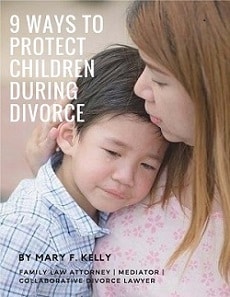It’s January 2019. The holidays are over. For many separated and divorced parents, the holidays are a mixed event: a time for special celebration with their child or children, and a time of heightened stress. Both parents’ wishes to have a joyful Chanukah/Christmas/Kwanzaa with the children can collide with reduced access time for each parent.
With the holidays behind, it’s a good idea to assess your visitation time with the children.
Make giving and receiving gifts joyful
Did you ask your children what gifts they received from the other parent? If you show dislike for a gift from the other parent because you feel jealous or you disapprove, it takes away from your child’s joy in getting it. Bring it up with the other parent if it’s inappropriate or you wish you had been consulted first. Show interest in your child’s gifts even if they are from a stepparent you hate.
Did you take any steps to make sure your children bought or made a gift for the other parent? Younger children especially need help finding or thinking of gifts. It shows them that giving is important and that you respect and honor the other parent’s role in their lives.
Did you plan your gift choices with the other parent beforehand? This is not always necessary, but when children put big-ticket items on their list, parents should discuss who will buy what. Your kids will be uncomfortable if one parent assumes the other will buy what they want most, or if both parents buy it and one has to be returned. It’s also best to discuss gifts that the other parent may not allow, or ones that the child will want to bring back and forth to both homes.
Going to church or temple with your children during the holidays
If you have a religious identity, have you given up involving your children in spiritual activity because the shared access time makes it difficult? Unless both parents share the same religious goals for their children, divorce can make it hard to get your children to participate regularly. If you want to try again, take small steps like incorporating one service into your holiday ritual. Be flexible with the timing, if possible, since overscheduling is a source of stress, not celebration.
Do your children feel stressed or guilty going back and forth between homes?
Did you give your children opportunities to shape activities they took part in during the holidays? Sometimes the schedule in your parenting agreement, intended to be “fair” to both parents, asks too much of your children. If dividing their time “fairly” between you means leaving in the middle of the other parent’s holiday meal to be with you, they may feel you care more about counting minutes than about them. If you will be be alone when they are with the other parent, make plans with friends or other family members. Make sure your children don’t carry the burden of your loneliness because of a divorce they didn’t ask for.
Did you see any signs of anxiety in your children as they tried to meet the expectations of you, the other parent and both extended families? Coparenting expert Christina McGhee says kids wish they could tell their parents, “It’s stressful trying to figure out how to keep everyone happy and it makes me dread the holidays.” Remember that parents, not children, are responsible for the holiday visitation schedule. Your children love both of you and don’t want to be responsible for hurting anyone’s feelings.
Don’t refuse visitation or give it up because you feel that you failed somehow
When you refuse to allow visitation with the other parent, or you consider giving up holiday time with them, kids feel like you don’t care about them. Bitter arguments over the holiday schedule and punishing the other parent by withholding visitation hurt your children. If you feel that your ex-spouse has poisoned your relationship with your kids, show up for your time with them anyway. If you can’t measure up to the costly extravaganza he or she provides, remember that what they need more than expensive gifts is quality time with both of their parents.
Like all families, yours probably has unique circumstances that shape your viewpoint. What is common to all divorced or separated families is that the holidays present a challenging time for both parents and children to have a “holiday” time. They are also an opportunity for divorced or separated parents to assess their children’s experiences and consider what could be done differently. It’s time to make holidays better for divorced families.




